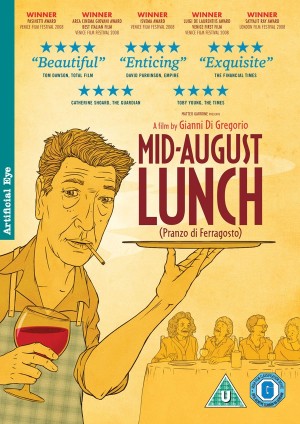Dir. Gianni di Gregorio
2008
7.2

Intermittently throughout Gianni di Gregorio's debut feature Mid-August Lunch (of which he is the writer, director and lead actor) I couldn't help but ask myself “What would Woody Allen do?” Gregorio the writer/director culled his screenplay from a would-have-been scenario: in mid-August, just before the Italian summer holiday Ferragosta, his landlord drops in to remind him of his mounting debt. The landlord gives Gregorio the option of wiping the slate clean by watching after his aging mother for a few days. Where Gregorio the writer/director, who already spends much of his time caring for his own madre, pridefully declines, Gregorio the character resignedly acquiesces. Knowing this fictional fork in the road, Gregorio the actor fails to convince the audience he is living anything other than a fanciful daydream; a “what if?” scenario one muses on absently rather than considers thoughtfully.
Allen, who often relived the most acutely painful and rapturous moments of his life through his films, managed to maintain a distance between himself as an artist and the intimacies of his private life even as they were being portraying honestly on the screen. Gregorio intuitively limits the artistic and emotional distance between himself and his precious chamber comedy. It's important to realize that Gregorio did not originally write the part for himself. However, when it came time for production and a “middle-aged man, more or less an alcoholic, who had lived for years with his mother” was called for, Gregorio presumed the autobiographical nature of the part would allow him to easily transition between the subjective, lived-in role and his directorial duties. This assumption proves incorrect. Gregorio's Gianni is a shallow, uni-dimensional character, lacking the intuitive self-criticizing and moral doubtfulness of Allen. Gianni's character is a patron saint of patience and humility. Even his constant consumption of wine is merely a crutch the director uses to insinuate rather show Gianni's frustration and stress.
Once this initial barrier of absurdity is crossed and the ladies (four in total) settle in with Gianni as their dutiful caretaker the film does take on a relieving, earnest realism. The set pieces are finely realized and range from the comic (the landlord's mother escaping for a night of drinking and smoking and her misguided attempts at seducing Gianni) to the genuinely affecting (the chattering mother of Gianni's doctor thoughtfully reminisces about her youth as the camera moves slowly across the room toward a dimly lit open window). In fact, the film's most imprecisely enjoyable moments occur when Gianni is elsewhere and any combination of the non-actors playing his lounging geriatrics are left to their own devices. They quibble and elicit fond forgotten memories drawing an attentive portrait of a culture that is quietly disappearing.
This particular aspect is definitely the film's strong suit: the credence given to the experiences and the motivations of the elderly. When it comes to consensus on aged Italians stereotypes abound: from venerable and dangerous (think Tony Soprano's mother) to callous and crazy. Few take into consideration the loneliness faced by the elderly who, even in their ostensible childishness, are nevertheless reaching out desperately for camaraderie. The acute sadness felt at the film's final scene where Gianni announces that the landlord will be arriving soon to retrieve his kin is the mature complement to kids at summer camp. The “it's over already?” sensation and the pleading with the retrievers for just a few more precious moments in the anomalous universe they've built for themselves through mutual affections and shared experiences. Though Gregorio alleviates the tension coarsely by turning it into a half-hearted joke, the attentive viewer retains the impression nonetheless.
This Italian indie proves not so much an outstanding success as a modest and occasionally elegant first effort. Gregorio, whose previous credits include co-writing the critically celebrated Gomorrah, has proved that he can do wide scope writing in a socio-political context. However, it has never been an accepted assumption that because one can paint beautiful landscapes that one can also produce a fine portrait. Though Mid-August Lunch is clearly a beloved pet project and one more devotedly human than Gomorrah if Gregorio is to exceed the unpretentious expectations set by his debut he may want to take a page from that other, aforementioned triple-threat filmmaker.
No comments:
Post a Comment